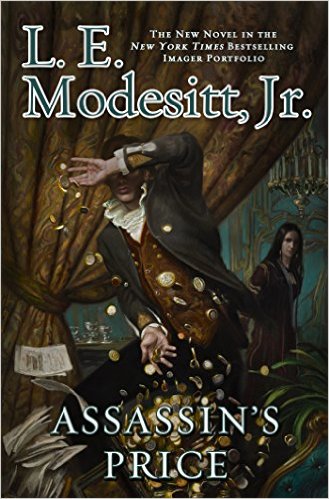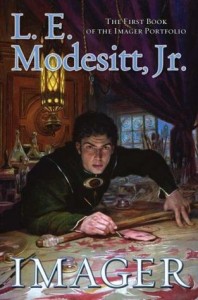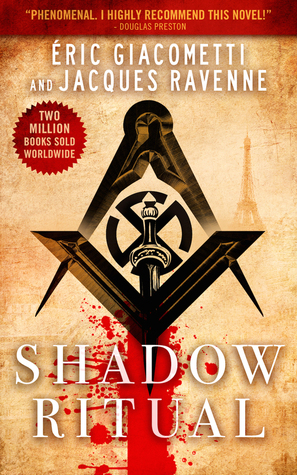 Assassin's Price (Imager Portfolio, #11) by L.E. Modesitt Jr.
Assassin's Price (Imager Portfolio, #11) by L.E. Modesitt Jr. Formats available: hardcover, ebook, audiobook
Series: Imager Portfolio #11
Pages: 512
on July 25th 2017
Purchasing Info: Author's Website, Publisher's Website, Amazon, Barnes & Noble, Kobo, Bookshop.org
Goodreads
Assassin's Price is the eleventh book in the bestselling, epic fantasy series the Imager Portfolio by L. E. Modesitt, Jr. and the third book in a story arc which began with Madness in Solidar and Treachery's Tools.
Six years have passed since the failed uprising of the High Holders, and the man behind the conspiracy is where the rex and Maitre Alastar can keep an eye on him.
Charyn has come of age and desperately wants to learn more so he can become an effective rex after his father but he s kept at a distance by the rex. So Charyn sets out to educate himself circumspectly.
When Jarolian privateers disrupt Solidar s shipping, someone attempts to kill Charyn s younger brother as an act of protest. Threatening notes following in the wake of acts of violence against the rex and his family, demanding action build more ships or expect someone to die.
The Imager Portfolio#1 Imager / #2 Imager s Challenge / #3 Imager s Intrigue / #4 Scholar / #5 Princeps / #6 Imager s Battalion / #7 Antiagon Fire / #8 Rex Regis / #9 Madness in Solidar / #10 Treachery s Tools / #11 Assassin s Price (forthcoming)
Other series by this author: The Saga of RecluceThe Corean ChroniclesThe Spellsong CycleThe Ghost BooksThe Ecolitan Matter
"
My Review:
 After two book failures, I gave into temptation and picked up Assassin’s Price about a month before I’m scheduled to review it. And I’m very glad I did. Just like all of the books in the Imager Portfolio (starting points are Imager, Scholar or Madness in Solidar) this one sucked me in and didn’t let go until the very end.
After two book failures, I gave into temptation and picked up Assassin’s Price about a month before I’m scheduled to review it. And I’m very glad I did. Just like all of the books in the Imager Portfolio (starting points are Imager, Scholar or Madness in Solidar) this one sucked me in and didn’t let go until the very end.
And now, as usual, I’m stuck waiting a year until the next one comes out. Because this story definitely isn’t over. Thank goodness.
Assassin’s Price takes place six years after the equally marvelous Treachery’s Tools, but this entry in the series switches perspectives, and that’s part of what makes it work so well.
At the end of Treachery’s Tools, Maitre Alastar had decisively ended the threat to the Collegium and to the rule of Rex Lorien. But six years is a long time, especially in politics, and people forget. Sometimes willfully.
But this isn’t Alastar’s story. Nor is it Rex Lorien’s. Just as with all of the previous books in this series, this is a story about coming into power, and specifically about the coming into power of someone who has already come of age.
Rex Lorien’s oldest son Charyn will be Rex someday, but that day is not supposed to be yet. He’s a young man in waiting for an event that he hopes will not come soon, because they only way he becomes Rex is when his father dies. And in spite of Rex Lorien’s authoritarian grip on the Regial household, he is doing the very best he can in surprisingly limited circumstances, and he really does love his family – and vice versa. This just isn’t a family where those emotions get expressed all that often.
But Charyn is old enough that playing the self-indulgent and over-indulged prince has begun to pall. He needs purpose. And as much as he doesn’t want to be Rex anytime soon, he is tired of being left out of all decisions and barred from any information about the state of the kingdom he will someday inherit.
So he starts cultivating his own sources, and in a direction from which his somewhat paranoid father is unlikely to feel threatened. And he hopes to learn things that seem to be outside the grasp of entirely too many people. One of the realities of life in Solidar is that the world is changing, not that that isn’t true everywhere all the time. But Charyn lives at a time when the power of the nobility, the major landholders, is slowly fading, while the power of the factors, the merchants and business interests, is very much on the rise.
Charyn gets himself a seat on the Solidaran equivalent of the Mercantile Exchange. It gives him the perfect opportunity to learn what factors do, and what they don’t. This knowledge becomes critical when an anonymous assassin begins threatening the Regial family and their holdings in protest of the Rex’ slow build up of a naval fleet to protect shipping interests. The anonymous assassin represents himself (herself, itself) as being one of the factors.
But as the outer tendrils of the plot come to light, it becomes clear that whoever or whatever is behind the threats has been planning their campaign for months if not years – and that they have sources within the Regial palace itself.
The Rex is dead, long live the Rex. Suddenly Charyn is the one on the very hot Regial seat, trying to work with councilors and advisers who seem to be certain that they don’t have to pay any attention to what he says or does, because they believe he’s not going to live all that long.
Charyn races to uncover the plot by any means necessary, before it takes his life and plunges his country into chaos.
Escape Rating A-: The first quarter of this book, while interesting, was not the stuff of high drama. In the beginning, we see Charyn learning, trying to discover a purpose and a way of keeping himself intellectually engaged. Also his father, Rex Lorien, doesn’t exactly show himself in the best light. He’s paranoid and very authoritarian in ways that grate. But like the old joke, you’re not paranoid if someone really is out to get you, and someone really was out to get him. It turns out that he’s not a bad man, just frustrated and overwhelmed. And then dead.
The pace really picks up when Charyn unexpectedly becomes Rex. Once he takes center stage, the story clips along at breakneck pace. Although relatively little time elapses, Charyn is under siege and under threat from the moment he becomes Rex. His realization that his councilors don’t care what concessions they grant him is because they are all certain he will be assassinated in short order is chilling.
And yet, he builds allies and keeps trying, not necessarily to win them over to his side, but to convince them that he’s going to live more than long enough for being on his side to matter. It’s an uphill battle, but a fascinating one.
 Although this is part of the Imager Portfolio, the imagers themselves do not feature greatly in it. In this story, the imagers are doing what their founder, Quaeryt envisioned, not being a power themselves but keeping the balance between all the factions, between the Rex, the high holders and the factors. And as Quaeryt envisioned and Alastar exemplified, the way they do that best is by keeping good Rexes alive and functioning.
Although this is part of the Imager Portfolio, the imagers themselves do not feature greatly in it. In this story, the imagers are doing what their founder, Quaeryt envisioned, not being a power themselves but keeping the balance between all the factions, between the Rex, the high holders and the factors. And as Quaeryt envisioned and Alastar exemplified, the way they do that best is by keeping good Rexes alive and functioning.
But speaking of Quaeryt (and I believe that the character pictured on the cover of Rex Regis IS Quaeryt and not the Rex), the hero of the middle five books in this series from Scholar to Rex Regis, it was good to hear him spoken of again, and to have his legacy recognized. Tying this present story back to some of his (and his redoubtable wife Vaelora’s) actions was a very nice touch and a way of setting this piece of the story into proper sequence. For readers who start with Madness in Solidar, knowing who Quaeryt was and what he did isn’t necessary to enjoy this part of the story, but the books are marvelous for anyone who loves politically charged epic fantasy.
This is a series that, as a whole, manages to do an excellent job of making political machinations endlessly fascinating. In this world, politics is always war conducted by other means, and it’s always a race to see if the hero, in this case Charyn, can manage to outmaneuver his enemies before that always impending war breaks out.
But speaking of the war, once things get settled within Solidar, it looks like Charyn will have some external enemies to deal with. And I can hardly wait.
Quick Q&A with author L.E. Modesitt, Jr.
Marlene: So often, epic fantasy is the realm of coming of age stories, where the destined hero or heroine comes of age and into their destiny during the course of the story. The Imager Portfolio is different in that regard. None of the heroes, not Rhenn, not Quaeryt, certainly not Alastar or even Charyn feel like destined heroes. They’re just the right person at the right time. And, this part has always fascinated me, these are explicitly not coming of age stories. All the heroes are adults at the beginning of their adventures. Possibly relatively young adults, but not “young adults” as the term is generally meant. They are grown ups who already have a life mapped out for themselves when their circumstances change and they are suddenly thrust into power they did not expect. So the stories are coming into power stories that are explicitly not coming of age stories. How did that come about? Was that a conscious decision, or did things just evolve that way over the course of the series?
Lee: I’d have to say that the first three books about Rhenn came about in the way they did as a combination of autobiographical factors and an underlying philosophy/concern of mine, in that I’m not much of a believer in “destiny from birth.” That’s because my own life, and the lives of many other people I’ve known, took radically different paths from what anyone could have predicted. When I was truly a young adult, I very much wanted to be painter and a poet. I even had a painting place in a small scholastic art competition, but the plain fact is that while I have excellent gross motor control, my fine motor control is a bit shaky, perhaps from a mild case of polio as a child, and I realized that my artistic conceptions were far beyond my physical capabilities. Then there was the fact that when I graduated from college, my family-endorsed semi-career plan, similar in a way to what Rhenn’s family planned for him, to go to law school and join my father’s law firm, ran into an immediate and absolute roadblock. There was a war in Vietnam in progress, and rather than let the government decide my fate, I went through Navy OCS and emerged a very green ensign, assigned to small amphibious craft, a duty I detested so much that I volunteered for flight training in the middle of a war, a rash decision definitely not calculated to maximize survival. In short, I never got back to the “family plan” because my Navy experience as a search and rescue pilot made me realize several things, but especially that I didn’t want to be a lawyer. Yet later on, ironically, in my nearly twenty years in Washington, virtually all the political and consulting jobs I held were the type of positions usually held by lawyers. That might be one reason why I’m a great believer in irony.
All of those experiences also conveyed to me the fact that no sane person ever sets out to be a hero, but that some people do amazing deeds, when required by their place in life and their background. There’s definitely some of me in each of the main protagonists in the Imager Portfolio. So… the summary of this long answer is that the structure was planned, but heavily influenced by autobiographical experiences of various sorts.
Marlene: Now that I’ve finished Assassin’s Price, I’m waiting breathlessly for the next one. Any idea what it and it’s title will be? And when?
Lee: I’m currently working on the sequel to Assassin’s Price, which also features Charyn, but since I’m only about halfway through, I’m not ready to say much yet, but that means, if I finish on schedule, it won’t be available until late in 2018 or sometime in 2019. And so far I haven’t settled on a title. In the meantime, there are two new Recluce books on the way, The Mongrel Mage, coming out this October, and its immediate sequel, Outcasts of Order, scheduled for release next June.
~~~~~~ GIVEAWAY ~~~~~~
I absolutely adore this series, so I am very happy indeed that, thanks to Tor Books, I am able to give away one copy of Assassin’s Price to a lucky US/Canadian commenter.

 Shadow Ritual (reviewed today
Shadow Ritual (reviewed today 

 About Linda Lael MillerThe daughter of a town marshal, Linda Lael Miller is a #1 New York Times and USA TODAY bestselling author of more than one hundred historical and contemporary novels, most of which reflect her love of the West. Raised in Northport, Washington, the self-confessed barn goddess now lives in Spokane, Washington. Linda hit a career high in 2011 when all three of her Creed Cowboys books—A Creed in Stone Creek, Creed’s Honor and The Creed Legacy—debuted at #1 on the New York Times bestseller list.Linda has come a long way since leaving Washington to experience the world. “But growing up in that time and place has served me well,” she allows. “And I’m happy to be back home.” Dedicated to helping others, Linda personally finances her “Linda Lael Miller Scholarships for Women,” which she awards to those seeking to improve their lot in life through education.More information about Linda and her novels is available at her
About Linda Lael MillerThe daughter of a town marshal, Linda Lael Miller is a #1 New York Times and USA TODAY bestselling author of more than one hundred historical and contemporary novels, most of which reflect her love of the West. Raised in Northport, Washington, the self-confessed barn goddess now lives in Spokane, Washington. Linda hit a career high in 2011 when all three of her Creed Cowboys books—A Creed in Stone Creek, Creed’s Honor and The Creed Legacy—debuted at #1 on the New York Times bestseller list.Linda has come a long way since leaving Washington to experience the world. “But growing up in that time and place has served me well,” she allows. “And I’m happy to be back home.” Dedicated to helping others, Linda personally finances her “Linda Lael Miller Scholarships for Women,” which she awards to those seeking to improve their lot in life through education.More information about Linda and her novels is available at her  Please enjoy this Q&A from Lori Foster, who recently published No Limits (reviewed
Please enjoy this Q&A from Lori Foster, who recently published No Limits (reviewed 


 About Susan Mallery
About Susan Mallery



 About Eleanor MoranEleanor Moran is the author of three previous novels: Stick or Twist, Mr Almost Right and Breakfast in Bed, which is currently being developed for television. Eleanor also works as a television drama executive and her TV credits include Rome, MI5, Spooks, Being Human and a biopic of Enid Blyton, Enid, starring Helena Bonham Carter. Eleanor grew up in North London, where she still lives.To learn more about Eleanor, visit her
About Eleanor MoranEleanor Moran is the author of three previous novels: Stick or Twist, Mr Almost Right and Breakfast in Bed, which is currently being developed for television. Eleanor also works as a television drama executive and her TV credits include Rome, MI5, Spooks, Being Human and a biopic of Enid Blyton, Enid, starring Helena Bonham Carter. Eleanor grew up in North London, where she still lives.To learn more about Eleanor, visit her 
 My guest today is Carla Neggers, the author of today’s
My guest today is Carla Neggers, the author of today’s  About Carla NeggersCarla Neggers is the New York Times bestselling author of more than 60 novels, with translations in 24 languages. Born and raised on the western edge of the beautiful Quabbin Reservoir in rural Massachusetts, Carla grew up with tales of her father’s life as a Dutch sailor and her mother’s childhood in northwest Florida.At a young age, Carla began penning her own stories on a branch high up in her favorite sugar maple. Now she enjoys spending time at the family homestead (now a tree farm) with her six brothers and sisters and their families. When she’s not writing, Carla loves to travel, hike, kayak, garden, and, of course, dive into a good book. She lives with her family in Vermont, near Quechee Gorge.
About Carla NeggersCarla Neggers is the New York Times bestselling author of more than 60 novels, with translations in 24 languages. Born and raised on the western edge of the beautiful Quabbin Reservoir in rural Massachusetts, Carla grew up with tales of her father’s life as a Dutch sailor and her mother’s childhood in northwest Florida.At a young age, Carla began penning her own stories on a branch high up in her favorite sugar maple. Now she enjoys spending time at the family homestead (now a tree farm) with her six brothers and sisters and their families. When she’s not writing, Carla loves to travel, hike, kayak, garden, and, of course, dive into a good book. She lives with her family in Vermont, near Quechee Gorge.